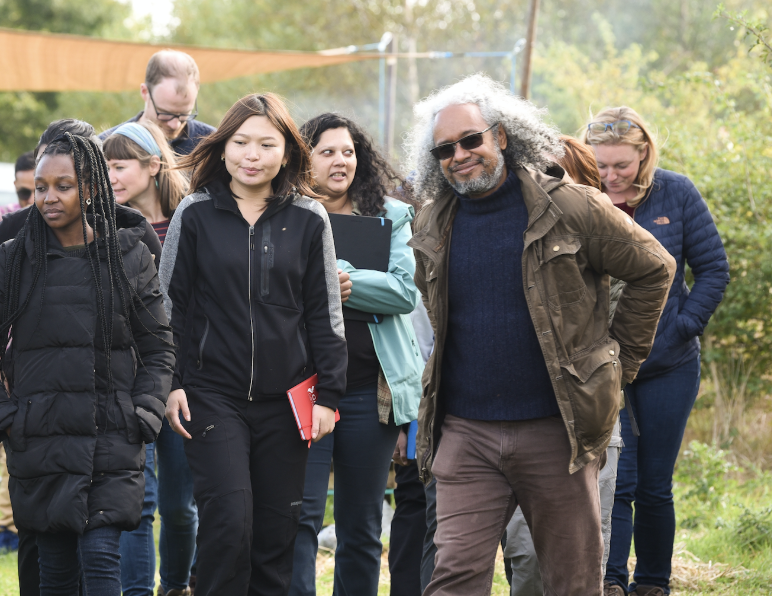
Submitted by S. Bolderson on Wed, 29/01/2020 - 14:19
- What were you doing before joining the CL Team?
I have spent the last 6 years running a MSc programme in Wildlife Conservation at the University of Chester, where I was a senior lecturer and my teaching included ecological field research techniques and landscape-scale wildlife management approaches. My PhD students work on a range diverse questions from species richness and distribution of cetaceans in the coastal waters of Trinidad to landscape genetics of Grenada dove. My current research focuses on ecosystem services in coastal dry forests of Grenada, sustainable hunting on Trinidad, patterns in Caribbean endemic bird conservation, and small carnivore conservation in Suriname. I have also been involved in DEFRA's Darwin Expert Committee, and on the boards of the Caribbean Natural Resources Institute, the Global Diversity Foundation and BirdsCaribbean, and the Knowledge and Data Taskforce of IPBES.
- What made you want to work on the Masters?
The short answer is – the students. The diversity of countries, backgrounds and experiences as well as their potential to make a contribution to reversing the biodiversity crisis – they are the reason I was interested in working on the Masters programme. If we can give this next generation of conservation leaders the tools they need to make a difference in the biodiversity conservation in their home countries, this can provide us a means of reversing nature's decline globally.
- Now you are Lecturer what are you most excited about?
Perhaps the thing that excites me the most is learning from the perspectives of each new cohort of students. All of our students come from such a diverse range of conservation backgrounds, and already have their own experiences of conservation on the ground. Bringing these experiences into the classroom can generate a learning environment that is exciting and has the potential to provide new ideas. Being present as the facilitator/teacher in these environments will be very rewarding, and an exciting prospect.
- What do you think you will bring to the course?
I have been fortunate in my career to work on conservation questions in developing countries, in multiple roles including in government, NGO, private sector and as an academic. I am hoping that I can use these different experiences in my interactions with the students that these experiences will resonate with them.
- With a growing network of alumni full of leadership potential, what are you most excited for/interested in seeing
Our alumni represent a privileged group of individuals who have the potential to make important contributions to the transformation of the conservation landscape in their home countries. I am most excited to see how each of our alumni take on this challenge and the range of innovations they will develop as they progress through their careers
- What do you think you can bring to the Alumni Network, how can people work with you
As the Masters programme grows and evolves, I am keen to learn how we can support our alumni in the future, whether through continuing professional development, new networking opportunities, joint programmes/projects, opportunities for professional training etc. I am also excited to share my own experiences with the Alumni Network, and hope that the alumni feel that they can get in touch if they need advice or help with their own work.
Read Howards Biography
Howard Nelson earned his BSc. and MPhil. in Zoology at the University of the West Indies – St Augustine, and a dual PhD in Wildlife Ecology and Forestry from the University of Wisconsin – Madison. Howard was a Lecturer at the University of the West Indies-St Augustine on the MSc in Biodiversity Conservation and Sustainability in the Caribbean, and subsequently Senior Lecturer in Conservation Biology and Programme Leader for the Masters in Wildlife Conservation at the University of Chester, in the United Kingdom. He was CEO of the Asa Wright Nature Centre in Trinidad, and worked for Trinidad and Tobago's Forestry Division and as a policy specialist on wildlife, forests and protected areas for Trinidad and Tobago's Ministry of the Environment. Dr. Nelson currently serves as a member of the Darwin Expert Committee of the UK government's Department of Environment, Food and Rural Affairs (DEFRA) and is a member of the IPBES taskforce on knowledge and data. Howard has served on the boards of several global and regional NGOs including the Caribbean Natural Resources Institute (CANARI), BirdsCaribbean and The Global Diversity Foundation. He and his students work on diverse conservation questions in the Caribbean including genetics of Grenada dove, abundance and distribution of Trinidadian cetaceans, climate-change impacts on dry forests and sustainable hunting. Howard has worked in the Caribbean for almost 30 years, including as a consultant for the FAO and UNDP, and his specialities include wildlife, forest and protected areas policy, planning and management, sustainable wildlife use, endangered species conservation, ecotourism and conservation training. He is currently Lecturer in Conservation Leadership at Fauna & Flora International.
